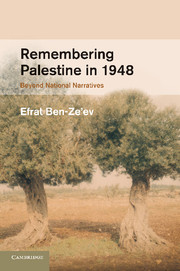Book contents
- Frontmatter
- Contents
- List of illustrations
- Maps
- Preface
- Map of Palestine prior to 1948
- Introduction
- Part I Constructing Palestine: National Projects
- Part II Palestinian-Arab Memories in the Making
- Part III Jewish-Israeli Memories in the Making
- Part IV British Mandatory Memories in the Making
- Conclusions and Implications
- Bibliography
- Notes
- Index
- Studies in the Social and Cultural History of Modern Warfare
Conclusions and Implications
Published online by Cambridge University Press: 07 October 2011
- Frontmatter
- Contents
- List of illustrations
- Maps
- Preface
- Map of Palestine prior to 1948
- Introduction
- Part I Constructing Palestine: National Projects
- Part II Palestinian-Arab Memories in the Making
- Part III Jewish-Israeli Memories in the Making
- Part IV British Mandatory Memories in the Making
- Conclusions and Implications
- Bibliography
- Notes
- Index
- Studies in the Social and Cultural History of Modern Warfare
Summary
This book focuses on a contested chapter in the history of the Middle East and on the ways people who lived through it understood and understand it. To uncover this story, it was necessary to lower the level of aggregation in our understanding of practices of remembrance of the upheaval of 1948. While well aware of Palestinian and Israeli official narratives, and their powerful impact, I have tried to go beyond them to show the ways smaller groups of people composed different stories, different understandings of what had happened to them. The outcome of the conflict in 1948 meant that “defeat” and “victory” served as a rough framework of these narratives. But that is just the beginning of the story of how people have remembered these events, then and now. As an anthropologist it has been my task to go back to the voices that have been to a degree drowned by political and politicized agendas.
Despite its robustness, it is evident that the national framework – what may be termed official memory – mutated over time. Certainly, the notions of national rebirth and national catastrophe are still there sixty years later, and are still dominant. Yet more localized, more isolated, more personal stories occasionally surface, which fit into older narratives, but also challenge their veracity or their utility. It is the jarring contrasts over time and within both Palestinian and Israeli narratives rather than the harmonies within the official story that formed the core of this book.
- Type
- Chapter
- Information
- Remembering Palestine in 1948Beyond National Narratives, pp. 188 - 194Publisher: Cambridge University PressPrint publication year: 2011

